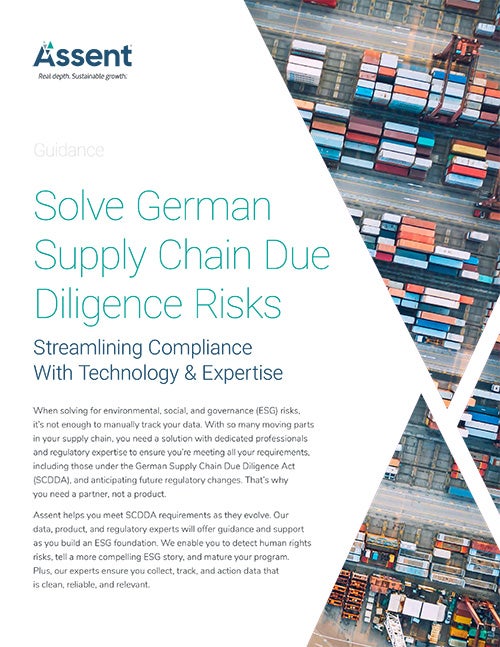Still Exploring?
Looks like you’ve been exploring our platform.
Want to see everything in one place?
View our solutions for getting standardized, validated, and usable product compliance data from your supply chain.
Supply chain transparency needed for compliance.
Identify PFAS in your supply chain and set yourself up for success.
Meet submission obligations with a deep view of your supply chain.
Deep-map your supply chain to streamline compliance.
Grow better with Assent’s TSCA compliance solution.
Uncover deep supply chain data to meet labeling requirements.
Verify the origin of your metals to avoid costly fines and delays.
See how we build your missing ESG foundation with our complete supply chain sustainability solution.
Deliver on your reporting needs with Assent ESG
Uncover hidden forced labor risks in your supply chain.
Deep transparency into mineral sourcing.
Easily see and manage the embedded emissions data of your goods.
Meet your German Supply Chain Due Diligence Act (SCDDA) requirements with confidence.
Confidently identify the entities and topics in your value chain that are most critical to compliance.
Learn about our trade compliance capabilities and how it uncovers hidden risks and opportunities.
Unlock supply chain transparency to mitigate trade risks.
Manage customs codes for your products.
Protect global market access & leverage trade agreements.
Verify the origin of your metals to avoid costly fines and delays.
Solutions for export classification code tracking.
Country of origin tracking supply chain solutions.
Discover how our automated supply chain sustainability management solutions help complex manufacturers see deeper, be smarter, and grow better.
Solutions for medical devices manufacturing.
Solutions for the electronics industry, across compliance and ESG.
Sustainability solutions for industrial equipment.
Supply chain sustainability for automotive.
Sustainability solutions for aerospace and defense.
View details about our complete supply chain sustainability platform, including product compliance, ESG, and trade compliance.
Evaluate and report on hidden risks in your supply chain.
Get a custom quote and find the right solution at the right price.
Learn about our data security protocols, to keep your information safe.
Reporting and data capabilities you need to meet your requirements.
View our integrations with SAP, PTC Windchill, and other standard APIs.
View details about our complete supply chain sustainability platform, including product compliance, ESG, and trade compliance.
Education, data collection, and technical support for suppliers.
Deep regulatory knowledge you need to build sustainable growth.
Managed services with dedicated support from world-class experts.
Assent regulatory experts have over 200 years of combined expertise. Learn more about how they helped make us the leader in supply chain sustainability.
View our content hub, including Interactive Tools, Webinars, Whitepapers, Guides and eBooks.
New Tools for understanding your requirements, risks, and our solutions.
Explore complex supply chain sustainability topics.
Get up-to-date information on constantly evolving topics.
Keep on top of existing or emerging regulations and trends.
Learn directly from experts on wide-ranging topics.
Discover why so many top companies have chosen Assent.
Access the Assent Knowledge Center, the leading regulatory resource for supply chain management, from our team of experts.
New Per- and polyfluoroalkyl substances (PFAS)
New Streamline your reporting process to comply with the EU CSRD.
Deep transparency into mineral sourcing.
Supply chain transparency needed for compliance.
Environmental, social, and governance (ESG) issues.
Deep-map your supply chain to streamline compliance.
The German Supply Chain Due Diligence Act (SCDDA) .
Grow better with our TSCA compliance solution.
Read Assent’s blog for regulatory updates, supply chain sustainability advice, best practices, and more.
Learn everything you need to know about supply chain sustainability.
Get clear educational resources on key product compliance regulations.
Discover how ESG and your supply chain are connected.
Learn best practices for managing your trade requirements.
Keep up with changing responsible minerals expectations.
Get an expert breakdown of the REACH Regulation.
Read about upcoming events and webinars hosted by our world-class team of regulatory experts.
Access comprehensive educational resources to better understand your business and regulatory requirements, and how to build your programs to mitigate supply chain risk effectively.
Learn how we became the leading supply chain sustainability management solution for the world’s most responsible complex manufacturers.
Read about our ESG journey and access our corporate sustainability reports.
See the leading manufacturers working with us to achieve supply chain sustainability.
Meet the team that helped Assent become the leader in supply chain sustainability.
Read the latest news about Assent from around the world.
View our industry and technology certifications.
Read more about the organizations and partners working with us to create supply chain sustainability.
Find out how to get in touch with us.
Become an Assentee! Learn about our culture, purpose, and opportunities.


SCDDA non-compliance penalties include:




Improve your supply chain sustainability management by ensuring your program is effective and efficient. Assent’s SCDDA solution:
Collects compliance data using a certified survey
Supports Federal Office of Economics and Export Control (BAFA) questionnaire inserts
Provides supplier education on the SCDDA and other sustainability requirements
Includes corrective actions and evidence review tools
An effective compliance program for the German Supply Chain Due Diligence Act (SCDDA) requires both expertise and technology.
Download Assent’s guide to learn how to improve your supply chain sustainability data collection and reporting, and meet all nine SCDDA requirements.
Download

Knowing what’s required of you under the SCDDA is important. Here are some of the most commonly asked questions about this law.
German companies with 3,000 or more employees are currently in scope of the SCDDA. This includes all companies that have their head office, principal place of business, or registered office in Germany, or via a German contract abroad. In 2024 this will be extended to companies with 1,000 or more employees.
Environmental Risks: Companies are required to comply with international treatieslike the Minamata Convention on Mercury, the Basel Convention on the illegal transboundary movement of electrical and electronic waste, and the Stockholm Convention on Persistent Organic Pollutants.
Human Rights Risks: Forced labor, child labour, unsafe working conditions, negative community impacts, etc.
The law targets both, along with a company’s overall supply chain. Additionally, to comply with the SCDDA, companies must clearly communicate expectations to their suppliers.
Companies must also conduct risk analyses and takecorrective action if a violation with an indirect supplier is found.
While the SCDDA only applies to German companies, it is part of a larger ESG trend.
Regulations like the UFLPA and proposals like the EU Forced Labor Ban are taking a hard look at global human rights and environmental risks.
Also, suppliers of German companies in scope of the SCDDA will be affected by the law.
“Substantiated knowledge” exists if the company has verifiable and serious information about a possible human rights or environmental violation through indirect suppliers. This can be interpreted both narrowly (e.g. direct complaints received through the company’s complaints procedure) and broadly (e.g. where there is public information about human rights violations in a geographical location where the company has indirect suppliers).
The primary responsibility of the “Human Rights Officer” role is to monitor the enterprise’s internal processes for fulfilling the obligations of the German SCDDA. They are also responsible for debriefing senior management on a regular basis (at least once per year) about their work. While the Act is not prescriptive about the level at which this role needs to function, it would typically be performed by someone in a technical mid-level manager role.
Get the latest info on the SCDDA.


The German Supply Chain Due Diligence Act (SCDDA), also known as the Lieferkettensorgfaltspflichtengesetz (LkSG), is creating new risks for German companies. Un …


In this eBook, you will learn what steps you can take to build a GSCA compliance program that mitigates your risk effectively.


We explore the new human rights regulations impacting businesses.
Learn more about how Assent can help you attain compliance with the SCDDA and manage your supply chain data across product compliance and ESG.


Looks like you’ve been exploring our platform.
Want to see everything in one place?